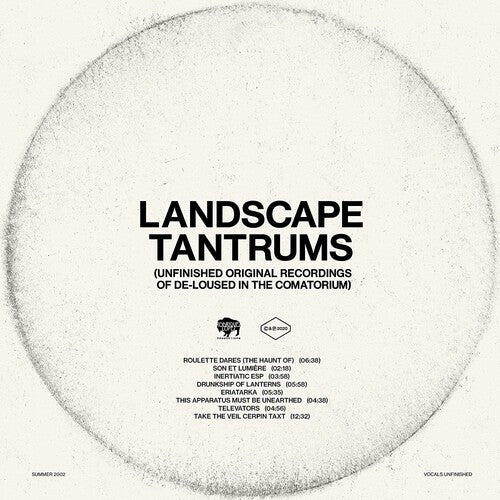Description
Landscape Tantrums Lost for two decades, the recent rediscovery of
Landscape Tantrums the first attempt at recording the music that would
become The Mars Volta’s De-Loused In The Comatorium revealed an
important and hitherto missing chapter in the group’s evolution.
Selfrecorded by Omar (assisted by Jon DeBaun) at Burbank’s Mad Dog
Studios within a head spinning four days, Landscape Tantrums captures
De-Loused in somewhat embryonic form, though much of what would make The
Mars Volta’s debut album such an electrifying, sublime experience was
already in place: the fearless invention, the fusion of futurist rock
elements and traditions from outside of the rock orthodoxy, the sense of
virtuosity working in service of emotional effect. From a distance, The
Mars Volta must have seemed as if they were on a high when they walked
into the studio to record what they expected to be their debut album (“I
didn’t think of it as demos or a dry run,” Omar says). The group had
recently played the Coachella festival to rave reviews, a vindication of
the quixotic risk Omar and Cedric had taken, quitting At The Drive In
to lead such an uncompromising musical proposition. Their debut EP,
Tremulant, had similarly signalled their singular vision, and been
rewarded with similarly positive feedback. But the truth was that The
Mars Volta entered Mad Dog in tatters, scarcely believing anything other
than failure lay within their reach. They’d recently lost their
bassist, Eva Gardner, and parted ways with keyboard play Ikey Owens.
Tensions were brewing with drummer Jon Theodore, too himself a
replacement for founding drummer Blake Fleming Omar questioning
Theodore’s commitment to the group. And sound manipulator Jeremy Michael
Ward’s drug problem had gotten so far out of hand that he’d been sent
to rehab, and wouldn’t return until two days into the Landscape
Tantrums. The pressure upon Omar was intense, and it began to manifest
in the form of physical and emotional breakdowns. His art was his life,
but now he began to wonder if it was actually going to kill him. Under
such heavy manners, miracles occurred at Mad Dog. Surely that’s the only
way to describe the music contained on Landscape Tantrums, as Omar
fashioned early versions of Inertiatic ESP, Drunkship Of Lanterns and
Eriatarka that rivalled the Rick Rubin produced versions that ended up
on De- Loused for intensity, precision and immediacy, as Cedric
delivered a powerfully intimate reading of Televators, and as a bare
bones version of the group sketched out the peaks of what would become
their debut masterpiece in barely half a week, on a shoestring, and
believing they wouldn’t last long enough to see it hit the shelves.
Listening to Landscape Tantrums now, with the benefit of hindsight and
the knowledge of what these songs will become, one notices Cedric has
yet to fully find the voice that will lend The Mars Volta their
devastating authority, that Eriatarka will evolve even further under
Rick Rubin’s watch, and that the lyrics to De-Loused’s climactic
chapter, Take The Veil Cerpin Taxt, have yet to be penned. But one also
notices how lithe the group sound here, how hungry, and one appreciates
the raw edge that Rubin would later polish to a venomous sharpness. More
than mere historical curiosity, Landscape Tantrums is an essential text
for the dedicated Mars Volta aficionado, and a breathtaking album in
its own right.

